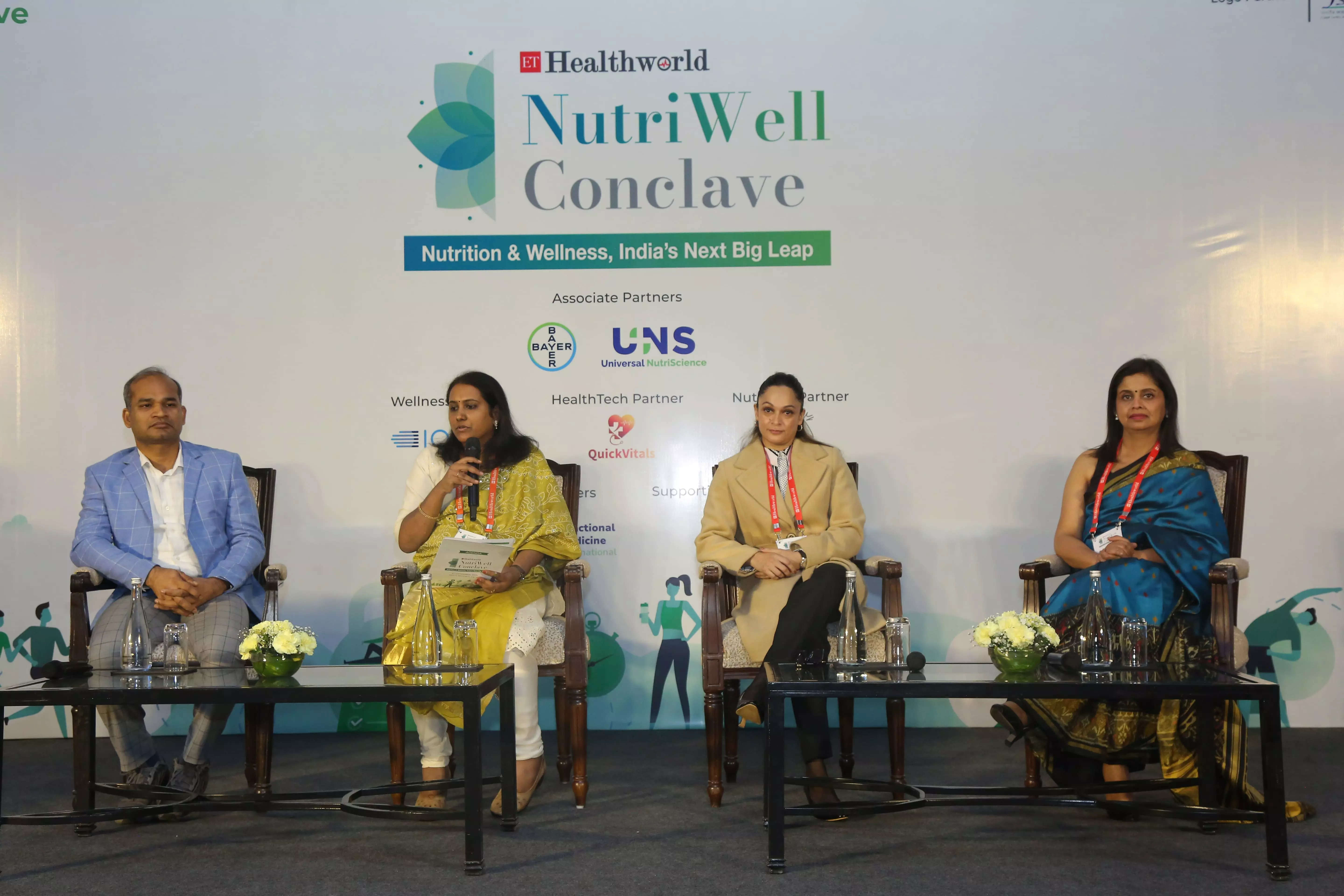
By Rashmi Mabiyan and Shilpasree Mondal
New Delhi: In recent years, the intersection of nutrition and sports performance has gained significant attention, with an increasing number of athletes and fitness enthusiasts recognizing the importance of a balanced, science-backed approach to fueling their bodies. However, despite the growing interest, there are still numerous challenges in optimizing nutrition for athletes, particularly in India, where awareness and understanding of sports nutrition remain limited.
From the regulation and quality control of supplements to the holistic approach required for peak performance, the sports nutrition landscape is evolving rapidly. As athletes face unique challenges, including dietary needs, hydration, and recovery, there is a pressing need for proper education, expert guidance, and improved awareness around nutrition’s critical role in both athletic performance and overall health.
At the ETHealthworld Nutriwell Conclave, a panel discussion titled “Optimizing Nutrition to Fuel Performance in Sports” featured insights from Dr. Manjari Chandra, Senior Consultant in Nutrition at Max Hospital, Dr. Arvind Prasad Gupta, Consultant Orthopaedic at Ligament, Joint & Arthritis Clinic in Patna, and Shwetha Bhatia, a Registered Dietitian and Sports Nutritionist. The panel was moderated by Prathiba Raju, Senior Assistant Editor at ETHealthworld.
The nutraceutical market for sports has seen a significant rise recently. Initially, these products were primarily sourced from outside India, mainly Europe and the USA. However, Indian companies are now entering the market.
Quality also varies significantly between manufacturers. “Not all companies have the same quality,” Dr. Arvind Prasad Gupta, Consultant Orthopaedic Ligament, Joint & Arthritis Clinic Patna, explained, raising concerns about consistency in product standards. He further pointed out the regulatory gaps, asking that the lack of clear guidelines from Indian authorities hampers the industry’s growth and credibility.
Dr. Gupta suggested that the Indian government needs to issue strict regulations to address these issues, focusing on both quality and standardized dosages. “There should be regulation from the Indian Government about the quality and dosage.” he remarked.
With proper regulation, Indian companies could potentially match the high standards of Western markets and deliver effective, high-quality functional foods. “In this way, we can provide high-quality drugs at the appropriate dose from the Indian side so that the effects are as possible in comparison to the Western market,” Dr. Gupta explained.
Dr. Manjari Chandra, Senior Consultant in Nutrition at Max Hospital, highlighted key gaps in sports nutrition. While regulation and quality issues in functional food are critical, she pointed out that sports nutrition often focuses too narrowly on specific supplements like creatine, protein, or caffeine.
“Athletic performance is like holistic health—you can’t achieve top performance by just adding supplements. The physical and mental well-being of athletes must be addressed together,” she explained.
Dr. Chandra emphasized that no body system works in isolation. Factors like muscular development, capacity, and overall health all play a role in performance. She stressed the importance of a comprehensive approach, including proper counselling, psychological support, nutrition, and supplements.
Shwetha Bhatia, a registered dietitian and sports nutritionist, emphasized the need for better awareness of sports nutrition. “At the elite level, many athletes have no idea about proper nutrition,” she noted.
Bhatia urged brands to focus on hiring dietitians as influencers rather than athletes or actors to ensure the right message is delivered. “We’re still stuck with traditional high-carb, low-protein approaches, in Indian diets, and budget constraints for grassroots athletes,” she explained.
She stressed that brands should prioritize creating affordable, credible products and spreading awareness about proper nutrition to support athletes truly.
Dr. Arvind Prasad Gupta, highlighted the critical role of hydration in sports performance. “Hydration is essential, from brain function to cardiac and joint health, as well as muscle performance and alertness,” he explained.
For athletes, especially those in endurance sports like cycling or marathon running, proper hydration is crucial. “They must stay well-hydrated, starting from the day before the event and even during it,” Dr. Gupta advised. He emphasized the importance of consuming water or electrolyte-rich fluids during the activity to maintain performance and alertness.
Dr Gupta further shared valuable advice for athletes prone to injuries. “Athletes are among the most vulnerable to injuries, and the first step is a proper warm-up before any game,” he emphasized.
If injured, he strongly advised consulting a doctor or physiotherapist rather than relying on coaches or others. “Neglecting minor injuries like partial tears in tendons or ligaments can lead to serious issues, causing long absences from the sport,” he warned.
Dr. Gupta also discussed the role of nutraceuticals, such as type 1 collagen for tendons and ligaments and type 2 collagen for cartilage. However, he cautioned that these supplements must be taken under professional guidance, as improper use could affect immunity. “Type 2 collagen works indirectly through T cells in the gut to regenerate cartilage, so dosage and timing are critical,” he explained.
He urged, “Never ignore joint injuries. Even minor ones can escalate into major problems if left untreated. Always confirm with a certified doctor or physiotherapist before continuing your sport.”
Dr. Manjari Chandra, explained that pushing the body beyond its limits without proper recovery can harm multiple systems, especially the cardiovascular system. “The body needs downtime to recover and rejuvenate, both physically and mentally,” she emphasized. Neglecting this leads to prolonged stress, elevated cortisol levels, and strain on the heart.
Dr. Chandra also cautioned against unscientific supplementation promoted by coaches and influencers. Overconsumption of supplements like caffeine or protein can have side effects, such as increased heart rate, kidney stress, or even liver issues. “Caffeine in moderation can be beneficial, but excessive intake can cause complications,” she noted.
Regarding protein intake, Dr. Chandra acknowledged India’s carb-heavy diet but warned against overdoing protein consumption. “Excess protein can stress the body, lead to weight gain, and even predispose you to conditions like fatty liver or high blood sugar,” she explained.
Highlighting the health issues athletes face, Shwetha Bhatia shared her observations from recent blood reports, which show high triglycerides, insulin resistance, high fasting blood glucose, and increased visceral fat in athletes.
She pointed out two categories: recreational athletes with existing health issues like heart conditions or diabetes who want to take up sports, and professional athletes who develop health problems over time. She emphasized that traditional high-carb diets may not be suitable for older athletes, contributing to the rise in conditions like diabetes in India.
Dr. Chandra, shared concerns about the widespread availability and questionable quality of supplements. She discussed the ease with which people can access gummies, powders, syrups, and energy drinks, many of which are high in sugar, and how this can negatively affect gut health. She emphasized the important connection between the gut and the brain, known as the gut-brain axis. When the gut microbiome is out of balance (dysbiosis), it impacts the body’s ability to produce essential neurotransmitters like serotonin and dopamine, which can lead to mental health issues like depression.
She warned that supplements, especially sugary ones, can worsen gut dysbiosis by encouraging the growth of unhealthy bacteria. This can create a negative cycle, lowering neurotransmitter levels and contributing to poor mental health.
Dr. Chandra also pointed out that, in sports nutrition, the focus should not be on the convenience of supplements like gummies or sugary drinks. Instead, supplements should be consumed with a clear understanding of their purpose for performance enhancement, and their formats should be more targeted and practical.
Shwetha Bhatia, emphasizes the importance of educating athletes about reading food labels. She points out, there’s a need for more information and structured educational opportunities, both academically and professionally, for aspiring sports nutritionists. This gap makes it challenging for individuals to enter the field and for athletes to access the guidance they need.
The experts addressed the overall lack of understanding of sports nutrition in India, citing a gap in awareness among practitioners, athletes, and the media. This opens up an opportunity for more dialogue and education in the country.







